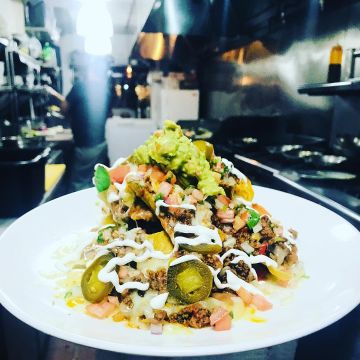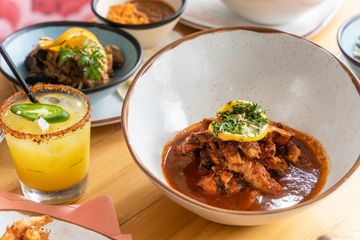Celebrate fun with happy hour and classic Mexican cocktails
Is Mexican Food Healthy And Balanced? Unloading the Nutritional Conveniences of Conventional Active Ingredients
The question of whether Mexican food is healthy and balanced welcomes an exploration of its standard active ingredients. Beans and corn act as fundamental staples, abundant in protein and fiber. Avocados supply beneficial fats, while different natural herbs and spices add taste and wellness benefits - New York Times rated. With each other, these parts create a tapestry of nutrition. Nevertheless, the healthfulness of Mexican food often depends upon preparation approaches and section dimensions. What duty do these factors play in determining its overall nutritional value?
The Power of Beans: Protein and Fiber-Rich Staples
Frequently neglected, beans serve as a foundation of Mexican cuisine, providing a wide range of nutritional advantages. Rich in healthy protein, they are a superb plant-based choice for those looking for to fulfill their nutritional healthy protein needs. This high protein content supports muscular tissue fixing and development, making beans very useful for both vegetarians and meat-eaters alike. Additionally, beans are a remarkable source of nutritional fiber, which aids in digestion and advertises a feeling of volume, possibly aiding with weight administration.
The variety of beans used in Mexican recipes, such as black beans, pinto beans, and kidney beans, adds to a diverse taste profile and can enhance dishes nutritionally. Additionally, beans are low in fat and include important vitamins and minerals, including iron, magnesium, and folate. Together, these features make beans an important ingredient, supplying both nutrition and sustenance in standard Mexican fare.

Corn: a Versatile Grain With Nutritional Perks
Corn stands out as a flexible grain essential to Mexican food, celebrated not only for its culinary applications yet additionally for its outstanding nutritional account. As a key ingredient in dishes like tortillas, tamales, and pozole, corn supplies crucial nutrients that contribute to a balanced diet plan. Rich in carbs, it offers as a substantial energy source, while also being low in fat, making it a positive choice for numerous nutritional needs.
Corn is a great resource of nutritional fiber, which helps in food digestion and advertises satiation. It consists of substantial quantities of vitamins such as B-complex vitamins, which are crucial for power metabolic rate. The visibility of anti-oxidants, specifically carotenoids, adds to general health and wellness by minimizing oxidative anxiety. Furthermore, corn is gluten-free, accommodating those with gluten sensitivities. In general, the nutritional benefits of corn emphasize its relevance in typical Mexican food and its duty in a healthy and balanced diet plan.
Avocados: Healthy Fats and Nutrients in Every Bite
Avocados play a significant duty in Mexican food, matching dishes with their creamy appearance and abundant taste. Beyond their cooking charm, avocados are celebrated for their impressive dietary account. They are a rich resource of healthy and balanced monounsaturated fats, which can help reduced poor cholesterol levels and assistance heart wellness. Furthermore, avocados are packed with crucial minerals and vitamins, including potassium, vitamin E, and B vitamins, adding to general wellness.
The high fiber web content in avocados aids food digestion and advertises satiety, making them a beneficial enhancement to any type of meal. Their one-of-a-kind nutrient make-up can likewise sustain skin health and wellness and offer anti-inflammatory benefits. Integrating avocados into typical Mexican meals or enjoying them as a standalone treat can boost both flavor and nourishment, demonstrating why they are a precious staple in Mexican food. Overall, avocados supply a tasty method to delight in healthy and balanced fats and critical nutrients in every bite.
Natural Herbs and flavors: Flavorful Health And Wellness Boosters
While delighting in the rich flavors of Mexican food, one can not ignore the essential role that spices and natural herbs play in enhancing both preference and wellness. Components such as oregano, chili, and cilantro peppers not only contribute to the vibrant flavor account however also provide significant health advantages. For example, cilantro is recognized for its detoxifying homes, assisting to get rid of hefty steels from the body, while oregano is loaded with anti-oxidants and possesses anti-inflammatory effects.
Chili peppers, a staple in many Mexican recipes, include lunch and dinner capsaicin, which has been connected to boosted metabolic rate and pain relief. Additionally, flavors like cumin and coriander support food digestion and might aid in blood sugar law. Including these flavorful wellness boosters right into dishes not only boosts the culinary experience but also advertises overall well-being, making Mexican cuisine not just scrumptious, yet also nutritionally advantageous.
Typical Cooking Approaches: Enhancing Nutrition and Flavor
Traditional cooking methods in Mexican food play an essential function in improving both nutrition and flavor, as they usually prioritize fresh components and classic methods. Strategies such as nixtamalization, where corn is soaked and cooked in an alkaline remedy, not just boost the nutrient account of tortillas yet likewise improve their digestibility - tacos. Additionally, using sluggish cooking methods, like stewing or braising, enables tastes to meld magnificently while retaining the honesty of the ingredients

Often Asked Questions
Are Mexican Food Portions Usually Larger Than Various Other Cuisines?
Mexican food sections are commonly bigger than those of numerous various other foods. This particular mirrors standard eating practices, highlighting common sharing and hearty meals, which can cause a much more substantial serving size generally.
How Does the Prep Work Method Affect Healthiness of Mexican Food?
Preparation techniques considerably influence the healthfulness of Mexican food. Methods such as grilling or steaming protect nutrients, while frying can enhance harmful fat web content. Selections of components and cooking styles eventually figure out total nutritional worth.
Can Mexican Food Be Tailored for Particular Dietary Limitations?
Mexican food can indeed be tailored for particular nutritional limitations. Replacements, such as utilizing corn tortillas for gluten-free diet regimens or incorporating more veggies, allow individuals to appreciate typical flavors while fitting numerous nutritional requirements.
What Prevail Misunderstandings Concerning Mexican Food and Health?
Typical mistaken beliefs concerning Mexican food consist of the idea that it is inherently harmful, extremely spicy, and entirely concentrated on fats. Actually, traditional dishes often feature healthy components and can be tailored to different dietary needs.
Are There Healthier Options at Mexican Dining Establishments?
Healthier options at Mexican restaurants often consist of smoked meats, beans, and fresh veggies. Selecting dishes that emphasize entire components and preventing heavy sauces can bring about an extra healthy dining experience, advertising general well-being.
The range of beans used in Mexican dishes, such as black beans, pinto beans, and kidney beans, adds to a varied flavor profile and can boost dishes nutritionally. Avocados play a considerable role in Mexican food, enhancing meals with their creamy texture and abundant flavor. Incorporating avocados right into standard Mexican meals or enjoying them as a standalone treat can improve both flavor and nourishment, demonstrating why they are a beloved staple in Mexican food. While taking pleasure in the rich tastes of Mexican cuisine, one can not overlook the crucial function that spices and herbs play in boosting both taste and health. Typical cooking approaches in Mexican cuisine play an important duty in improving both nourishment and flavor, as they often focus on classic techniques and fresh active ingredients.